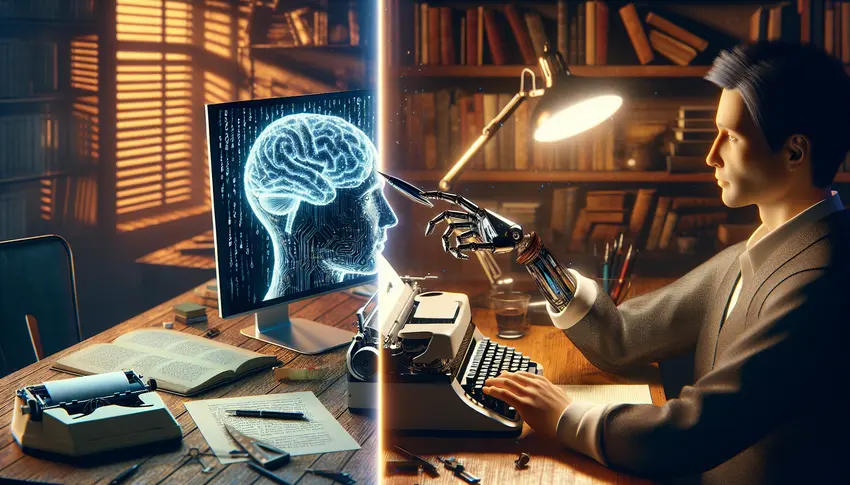Can DeepSeek AI Replace Human Writers?
The rise of AI has sparked debates across many fields. One prominent question is: Can AI, specifically models like DeepSeek AI, truly replace human writers? While AI excels at generating text quickly and efficiently, the answer is more nuanced than a simple yes or no. This guide explores the capabilities and limitations of DeepSeek AI and other similar tools, examining whether they can genuinely replace the creativity, critical thinking, and emotional intelligence that human writers bring to the table.
We’ll delve into the strengths of AI in content creation, such as its ability to automate tasks and analyze data. We’ll also explore its weaknesses, including a lack of originality and ethical judgment. By understanding both sides, you can form your own informed opinion on the future of writing in the age of AI.
Understanding DeepSeek AI and Its Capabilities
DeepSeek AI is an advanced AI model designed for various tasks. These tasks include content creation, data analysis, and problem-solving. It uses natural language processing (NLP) to understand and generate human-like text. Think of it as a sophisticated tool that can assist with many writing-related activities.
What Can DeepSeek AI Do?
- Content Generation: DeepSeek AI can quickly produce articles, blog posts, social media updates, and even creative writing pieces.
- SEO Optimization: It can analyze keywords, suggest headings, and optimize content for search engines.
- Data Analysis: DeepSeek AI can process large amounts of data and generate reports, providing insights for writers and marketers.
- Translation: It can translate content into multiple languages, making it useful for global audiences.
- Brainstorming: It can provide ideas and suggestions to overcome writer’s block.
These capabilities make DeepSeek AI a powerful tool for automating certain aspects of the writing process. However, it’s important to remember that it’s still a machine. It operates based on algorithms and data, which means it has limitations.
The Limitations of AI in Writing
While DeepSeek AI offers impressive capabilities, it’s not a perfect substitute for human writers. Several key limitations prevent AI from fully replacing humans in the writing field.
1. Lack of Originality and Creativity
AI generates content by analyzing existing data and patterns. It doesn’t possess genuine creativity or the ability to produce truly original ideas. Human writers, on the other hand, can draw from personal experiences, emotions, and unique perspectives to create innovative and engaging content.
Example: A human writer can craft a novel inspired by their own life experiences and observations. DeepSeek AI can generate a story based on existing novels, but it won’t have the same depth and emotional resonance.
2. Limited Emotional Intelligence
Writing often requires empathy and an understanding of human emotions. AI can simulate conversation, but it doesn’t truly understand or feel emotions. This limits its ability to connect with readers on a personal level.
Example: A therapist needs to empathize with patients to provide effective support. An AI chatbot can offer advice, but it can’t replicate the emotional connection between a therapist and a patient.
3. Ethical and Moral Judgments
AI operates based on algorithms and programmed rules. It lacks an ethical compass and the ability to make moral judgments. This can be problematic when dealing with sensitive or controversial topics.
Example: A journalist needs to make ethical decisions about what information to publish and how to present it. AI can analyze data, but it can’t make the same ethical considerations as a human journalist.
4. Inability to Adapt to Complex Situations
AI excels in controlled environments with predefined rules. However, it struggles with real-world unpredictability and complex problem-solving. Human writers can adapt to changing circumstances and think outside the box when faced with unfamiliar challenges.
Example: A firefighter needs to make quick decisions based on experience and gut instinct. AI needs preprogrammed rules and scenarios, which limits its adaptability in unpredictable situations.
5. Cultural and Social Context
Culture, humor, and social norms are deeply human concepts. AI struggles with understanding humor, sarcasm, and idioms. It also has difficulty adapting to cultural differences in communication.
Example: A marketer needs to understand cultural nuances to create effective advertising campaigns. AI might produce awkward or inappropriate jokes when trying to mimic humor across different cultures.
DeepSeek AI in Specific Writing Tasks
Let’s examine how DeepSeek AI performs in different writing tasks and whether it can replace human writers in these areas.
Content Marketing
In content marketing, AI can assist with tasks like keyword research, generating blog post ideas, and creating outlines. However, it can’t replace human writers entirely. Human writers are still needed to add creativity, emotional intelligence, and a unique voice to the content.
AI’s Role: Assisting with research, generating outlines, and drafting basic content.
Human’s Role: Adding creativity, emotional intelligence, and ensuring the content aligns with the brand’s voice and values.
Journalism
AI can help journalists by analyzing data, generating reports, and even writing basic news articles. However, it can’t replace investigative journalism, which requires critical thinking, ethical judgment, and human relationships.
AI’s Role: Analyzing data, generating reports, and writing basic news articles.
Human’s Role: Conducting investigations, interviewing sources, and ensuring ethical reporting.
Creative Writing
AI can generate poems, stories, and scripts, but it lacks the emotional depth and originality of human creative writers. AI-generated creative content often feels generic and lacks a unique perspective.
AI’s Role: Generating initial drafts and providing inspiration.
Human’s Role: Adding emotional depth, originality, and a unique voice to the creative work.
Technical Writing
AI can assist with technical writing by generating documentation, manuals, and guides. However, it needs human oversight to ensure accuracy and clarity. Technical writing often requires a deep understanding of the subject matter, which AI may lack.
AI’s Role: Generating documentation and manuals.
Human’s Role: Ensuring accuracy, clarity, and a deep understanding of the subject matter.
The Hybrid Approach: AI as a Writing Assistant
Instead of viewing AI as a replacement for human writers, it’s more accurate to see it as a powerful writing assistant. By combining the strengths of AI with the unique abilities of human writers, we can create a more efficient and effective writing process.
Benefits of Using AI as a Writing Assistant
- Increased Efficiency: AI can automate repetitive tasks, freeing up human writers to focus on more creative and strategic work.
- Improved Productivity: AI can help writers generate content faster, allowing them to produce more in less time.
- Enhanced Creativity: AI can provide new ideas and perspectives, helping writers overcome writer’s block and think outside the box.
- Better SEO: AI can optimize content for search engines, helping writers reach a wider audience.
How to Effectively Use AI as a Writing Assistant
- Use AI for research and brainstorming: Let AI gather information and generate ideas to kickstart your writing process.
- Use AI for drafting basic content: Let AI create a rough draft, then refine it with your own voice and expertise.
- Use AI for editing and proofreading: Let AI check your work for errors and suggest improvements.
- Always review and revise AI-generated content: Ensure the content is accurate, clear, and aligns with your brand’s voice and values.
Reminder: AI should be used as a tool to enhance human writing, not replace it entirely. Human oversight is crucial to ensure quality and accuracy.
The Future of Writing: Human and AI Collaboration
The future of writing likely involves a collaborative relationship between human writers and AI. As AI technology continues to evolve, it will become an even more powerful tool for writers. However, the unique skills and abilities of human writers will remain essential.
Key Trends to Watch
- AI will become more sophisticated: Future AI models will likely be more creative, emotionally intelligent, and adaptable.
- AI will be integrated into more writing tools: AI-powered features will become standard in word processors, content management systems, and other writing software.
- Human writers will focus on higher-level tasks: As AI takes over more routine tasks, human writers will focus on strategy, creativity, and critical thinking.
- Ethical considerations will become more important: As AI becomes more prevalent in writing, ethical issues like plagiarism and bias will need to be addressed.
Addressing Concerns About Job Security
One of the biggest concerns about AI is its potential impact on job security. While AI may automate some writing tasks, it’s unlikely to eliminate the need for human writers entirely. Instead, it will likely change the nature of writing jobs.
New Opportunities for Writers
- AI trainers and editors: Human writers will be needed to train AI models and edit AI-generated content.
- Content strategists: Human writers will be needed to develop content strategies and ensure that AI-generated content aligns with business goals.
- Creative writers: The demand for original, creative content will likely remain strong, providing opportunities for human writers.
- Specialized writers: Writers with expertise in specific industries or topics will be in demand to provide in-depth knowledge and insights.
Note: To stay relevant in the age of AI, writers should focus on developing skills that AI can’t replicate, such as creativity, critical thinking, and emotional intelligence.
DeepSeek AI and the Chinese Context
DeepSeek AI, being a China-developed AI chatbot, has certain unique characteristics and limitations. It’s important to consider these factors when evaluating its potential to replace human writers.
Strengths in the Chinese Context
DeepSeek AI has a strong understanding of the Chinese language, culture, and context. This makes it particularly useful for generating content for Chinese audiences.
Example: DeepSeek AI can generate wuxia novels (Chinese stories about knights doing kung fu) and modern poems that resonate with Chinese readers.
Limitations in the Chinese Context
DeepSeek AI is subject to Chinese censorship and political restrictions. It automatically avoids sensitive topics like politics and history. This limits its ability to generate content on certain subjects.
Example: DeepSeek AI might avoid discussing controversial political events or historical figures.
Impact on Truth-Seeking and Information Access
The limitations of DeepSeek AI in the Chinese context raise concerns about its impact on truth-seeking and information access. If AI is censored and restricted, it may not provide users with a complete and accurate picture of the world. For more on limitations, check out: DeepSeek AI Not Working: Fix Common Errors.
Important: It’s crucial to be aware of the limitations of AI in specific cultural and political contexts and to seek out diverse sources of information.
Conclusion
In conclusion, while DeepSeek AI and similar AI tools offer remarkable capabilities in content generation and optimization, they cannot completely replace human writers. The absence of genuine creativity, emotional intelligence, ethical judgment, and adaptability in AI models means that human writers remain essential for producing high-quality, engaging, and impactful content. The most promising future lies in a collaborative approach, where AI serves as a powerful assistant, augmenting human skills and freeing writers to focus on the strategic, creative, and uniquely human aspects of their craft. Embracing this hybrid model will not only enhance productivity but also ensure that the content we consume remains authentic, insightful, and truly reflective of the human experience.
FAQs
Can DeepSeek AI completely replace human writers?
No, DeepSeek AI cannot completely replace human writers. It lacks the creativity, emotional intelligence, and ethical reasoning necessary for many writing tasks. AI is best used as a tool to assist human writers, not replace them. See how writers can use DeepSeek AI for SEO.
What jobs are safe from AI automation?
Jobs that require creativity, human connection, ethical decision-making, and adaptability are safe from AI automation. These include roles in healthcare, education, journalism, and leadership.
How can writers stay relevant in an AI-powered world?
Writers can stay relevant by developing skills that AI can’t replicate, such as creativity, critical thinking, and emotional intelligence. They should also learn how to use AI tools effectively to enhance their writing process.
Will AI create more jobs than it eliminates?
Yes, AI is likely to create more jobs than it eliminates. New opportunities will emerge in areas like AI training, content strategy, and specialized writing.
Should businesses invest in AI writing tools?
Yes, businesses should invest in AI writing tools to augment human work, not replace it. The best approach is to use AI and human expertise together to create high-quality content efficiently. Read more about how DeepSeek AI is changing content creation.






